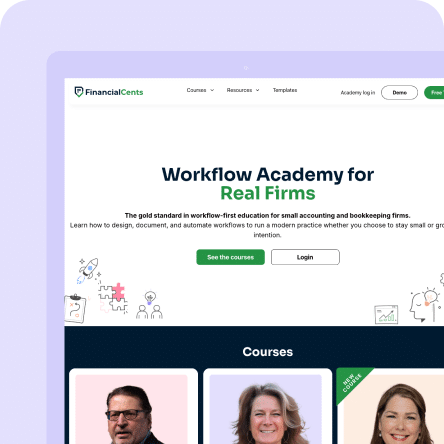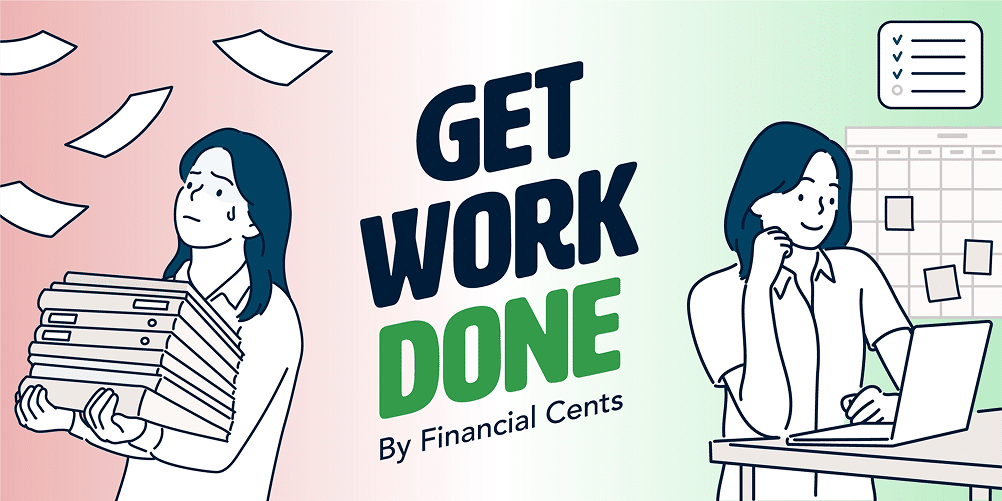S02 E11: Building Teams That Last: Recruitment and Retention Strategies for Scaling Your Accounting Firm
Guest: Randy Crabtree

Podcasts » S02 E11: Building Teams That Last: Recruitment and Retention Strategies for Scaling Your Accounting Firm
Accounting Flow is a podcast deep dive into accounting firm workflow & processes. In each episode, we uncover specific processes that firm owners and operators encounter on a daily basis and discuss ways to improve them. Brought to you by Financial Cents and hosted by Roman Villard, CPA, and Shahram Zarshenas.
In this insightful episode, Roman Villard, CPA, sits down with Randy Crabtree, co-founder and partner of Tri-Merit Specialty Tax Professionals, to discuss the critical elements of building teams that last. As firms scale, the challenges of recruiting and retaining top talent become paramount. Randy shares his proven strategies for fostering a strong workplace culture that attracts and retains skilled professionals.
Join us as we delve into:
- Effective Recruitment Tactics: Learn the best practices for sourcing and attracting top talent in the competitive accounting field.
- Retention Strategies: Discover the key factors that keep employees engaged and loyal, reducing turnover rates.
- Cultivating Culture: Understand the importance of creating a workplace environment that promotes growth, satisfaction, and long-term commitment.
Whether you’re a firm owner, manager, or HR professional, this episode is packed with actionable advice to help you build a resilient and thriving team.
Tune in.
Timestamps
Roman Villard
What’s up, everyone? Welcome to the Accounting Flow podcast brought to you by Financial Cents. This podcast is dedicated to taking a deep dive into accounting firm workflow and processes. In each episode, we will spend 20 minutes interviewing actual accounting firm owners just like you, uncovering specific processes that firm owners and operators encounter on a daily basis and discussing ways to improve them. Let’s go!
Roman Villard
Alright, we live here with another episode of Accounting Flow with the only Randy Crabtree. How are you?
Randy Crabtree
Oh, I’m doing well, you?
Roman Villard
I’m doing great. It’s a nice Friday. We’re recording here. Today, we’re going to talk about culture.
Randy Crabtree
You are right, and I am doing great. I can’t believe I said I’m doing well. I’m amazing. I’m awesome. I’m having fun. So great! That was a better answer than mine.
Roman Villard
Well, you just came off of the firm growth forum as well. Right.
Randy Crabtree
I got back last night. And I think the reason I said I’m doing well is that I got on the scale this morning. I’m like, holy cow. There’s no way I put on that much weight. But it was a fun time. Yeah, the conference was great.
Roman Villard
We are jumping into conference season here, which tends to take a toll on, you know, mental and physical well-being. So, definitely keep that a priority. But today, we get to talk about culture, which I know you’ve spent a lot of time talking about, and I’m really excited about. And ideally, we’re jumping into the workflow or jumping into the process. How do you set this up? How do you govern it? How do you preach it within your firm and to the outside parties? I’d love to hear philosophically. How do you think about culture?
Randy Crabtree
Yeah, that’s good. You mentioned before we went live that we could talk processes, and I’m like, processes bore the heck out of me. I don’t think that way. From a business owner’s standpoint, I’m probably awful. Process, procedure, KPIs—that stuff bores me. But when we’re talking about culture, there is a process. Your culture is intentional. You can’t just hope it happens. So, I guess I do a bit around the process. To get to your question, what do you think about culture?
Roman Villard
Yeah, philosophically, how do you think about it?
Randy Crabtree
This is a hard one because culture isn’t something physical you see, but you can feel it. Defining culture is tough for me. After hours of back and forth with ChatGPT, I came up with this: weak cultures rely on rules, while strong cultures rely on relationships. In our profession, rules are everywhere, and it’s easy to fall into the trap of relying on them. But relationships are everything. The people you work with are the most important. If we can build relationships and get to know our people, then instill things into the business that foster those relationships, that’s a process to strengthen culture.
Roman Villard
I like that a lot. I fully agree that relationships fuel culture. But I believe culture is represented differently by each person in your firm. Everyone has a different lens of what quality culture is. So, you need to create a bespoke environment that caters to how individuals can excel in relationships within your firm. How do you think about creating something that’s appealing to all?
Randy Crabtree
First, you have to define ‘bespoke’ for me. But I agree. Diversity in your firm is essential. Diversity creates culture. And I mean diversity in everything—skill sets, backgrounds, personal experiences. Without that diversity, we’d never succeed. For instance, we did sessions around CliftonStrengths, and it was eye-opening. We discovered our team’s strengths and how we fit together. That diversity, those different strengths, and personalities, are crucial. When we get together, we expand on these relationships, making our team stronger.
Roman Villard
I love it. So, step one is identifying core professional strengths and orienting accordingly within your organization. Step two is identifying the personal side of an employee’s journey. Like John Garrett’s “What’s Your And,” we ask, “What’s your Full Send?” We’ve got mountain bikers, gardeners, paddleboarders, hikers, and golfers. Knowing these personal interests helps us connect and properly incentivize our employees, creating a unique chemistry in the organization.
Randy Crabtree
I agree. There’s another step, though. Many business owners don’t evaluate their own skills and passions often enough. Seven years ago, I did this personally and transitioned from managing partner to a role more suited to my strengths and passions. This change helped our company grow significantly. We put a culture in place and allowed people to transition within the company into roles they were passionate about.
Roman Villard
How did you navigate that early on in the firm when it wasn’t possible to hand off roles? How did you orient your trajectory to ensure you were in the right seat?
Randy Crabtree
It took a lot of trial and error. It also took input from other people in the company. One of the most impactful lessons I learned was not ignoring a culture killer. Someone told me, “If this doesn’t change, I’m leaving,” and it made me realize I had to address issues, not just have fun. This realization led to my transition out of the managing partner role.
Roman Villard
Expanding your skill set and understanding better how to leverage your strengths for the firm must have been character-building. I love that you promote fun within the industry. Setting a tone of fun and enjoyment is crucial for culture and with that tone being set at the top you can’t underestimate the value of that as it relates to culture.
Randy Crabtree
I agree. You say such amazing things that it gets me thinking. In a remote environment, people often believe you can’t create a strong culture, but you can. We’ve been named one of the fastest-growing privately held companies in the US for the last two years, and we have other awards too. We’re intentional about our culture. Twice a year, we have retreats to build relationships. At a retreat in San Diego, a photographer told me she couldn’t figure out who the partners were because everyone was on an equal level and enjoyed each other’s company. This shows how fun and friendship are key to our culture. We’re like family. This culture attracts people. We don’t have to search for employees; they come to us through friends, family, and personal connections. This is how we grow our team.
Roman Villard
You’ve also shared impressive retention data. High retention and low turnover are indicators of a strong culture. Can you discuss that?
Randy Crabtree
I equate everything back to culture. In the 17 years we’ve been in business, we’ve grown to 70 people and celebrated our 17th anniversary two weeks ago. During that time, only seven people have voluntarily left. The most recent two departures were for exciting opportunities: one employee decided to go to medical school, and we celebrated that. Sure, we were sad to see him go, but it was a great opportunity. He gave us six months’ notice because he didn’t want to leave us hanging, and even asked if he could work part-time during medical school. Of course, we said yes. The other recent departure was a lawyer and engineer who decided to follow his passion for teaching law. We’re proud of him, too. Retention has been huge for us, and it all goes back to culture.
Roman Villard
Two concepts I want your opinion on: churn is not always bad, and paying people to leave. If someone wants to leave, advocate for them to create a good bond. Paying people to leave sounds counterintuitive but could create a graceful transition. What are your thoughts?
Randy Crabtree
I agree with the first concept. Supporting people when they leave creates positive relationships. The second concept is interesting. Paying people to leave could help small firms transition smoothly, but it depends on implementation. It could show employees they’re valued, even during transitions. For example, when the last two employees left, they saw how we supported and celebrated their decisions. Our announcements on Teams were full of good wishes and encouragement to stay in touch. Because of this, those who leave still speak positively about us. They tell others, “If you’re looking for a company that will find a role for you and support your passion, talk to Tri-Merit.” This is the first time I’ve mentioned our company name today. I’m not as good at marketing as you—I see you have “Full Send” on your name. I should add Tri-Merit or CPA to mine. So yes, being intentional is important, and we are naturally intentional about it. It’s just who we are.
Roman Villard
It’s all about creating a culture of transparency and openness. The firm owner must create an environment people want to stay. If it’s not a good fit, early communication allows for quality decisions and smooth transitions.
Randy Crabtree
Transparency is a huge part of culture—financial transparency, goals, and challenges. When people feel part of the organization, they rally around it. Transparency, vulnerability, empathy, and compassion are key.
Roman Villard
I’m excited about Bridging the Gap, one of my favorite conferences. It plays a big role in your firm’s culture, right?
Randy Crabtree
It does. We’d rather it not be a financial loss, so we’re aiming for 250 attendees. This not only builds culture within our company but also within the professional community. We have a strong, collaborative community in accounting, and I saw that shine through at the conference. I hope it does again.
Roman Villard
The ripple effect of what you create will come back in ways you can’t measure. Bridging the Gap’s intentionality is evident. Wellness rooms, yoga—it all shows you care about attendees’ well-being.
Randy Crabtree
We aim to create a positive environment. I’m looking forward to your sessions at the conference.
Roman Villard
I’m excited too. Randy, I very much appreciate the conversation on culture today. It’s something that I know we could drone on about for another hour or so. But thanks so much for joining Accounting Flow today. If people want to find you and Tri-Merit, where would they find you?
Randy Crabtree
LinkedIn and our website, tri-merit.com.
Roman Villard
Perfect. Thank you for joining us today.
Randy Crabtree
Appreciate it. I always have fun talking with you.
Roman Villard
If you enjoyed this podcast, don’t forget to share and write a review. This helps other firm owners find us and grow their firms. Stay tuned.




